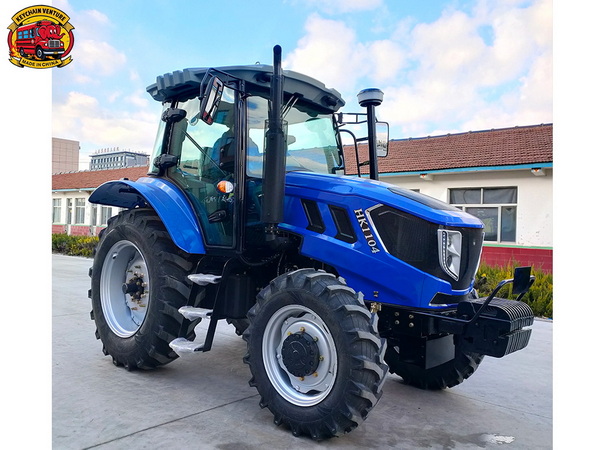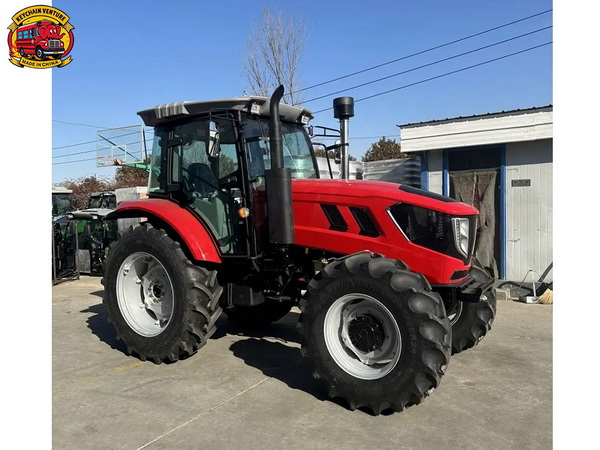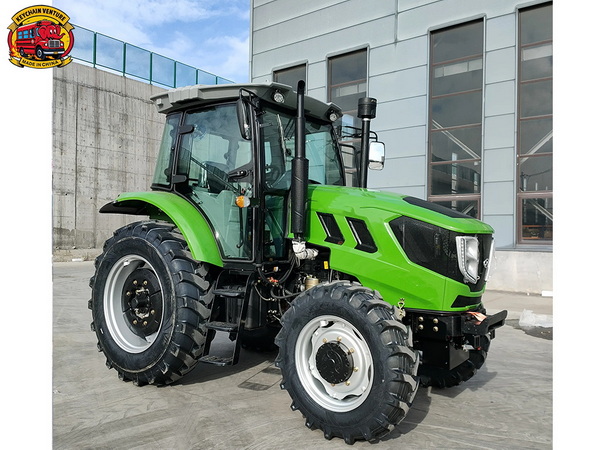Views: 222 Author: Amanda Publish Time: 2025-09-18 Origin: Site








Content Menu
● Understanding Used Tractor Financing
>> How Does Used Tractor Financing Work?
>> Benefits of Financing a Used Tractor
● Factors Affecting Used Tractor Financing Approval
>> Equipment Condition and Age
>> Down Payment
● Types of Used Tractor Financing Options
>> Term Loans
>> Commercial Vehicle Financing Through Dealerships
>> Alternative Financing Methods
● Step-by-Step Guide to Financing a Used Tractor
>> 1. Assess Your Needs and Budget
>> 3. Check Your Credit and Financials
>> 4. Choose the Right Financing Option
>> 7. Finalize the Purchase and Financing Terms
● Tips to Get the Best Financing Deal on a Used Tractor
● Common Challenges When Financing a Used Tractor
● FAQ
>> 1. Can anyone finance a used tractor?
>> 2. How much down payment is typically required?
>> 3. Is leasing better than buying a used tractor?
>> 4. Do used tractor loans have higher interest rates?
>> 5. How long do used tractor loans usually last?
In the commercial vehicle industry, purchasing a used tractor offers a cost-effective solution for businesses seeking reliable transportation without breaking the bank. However, many buyers wonder, "Can you finance a used tractor?" The answer is yes, but the process requires careful consideration of financing options, lender requirements, and the condition of the tractor. This article explores how financing a used tractor works, the benefits, challenges, and tips to secure the best deal.

Financing a used tractor differs from buying a new one primarily due to factors like depreciation, condition, and lender risk assessment. A used tractor generally costs less upfront, making it attractive for small and medium-sized enterprises that want to optimize cash flow.
Lenders evaluate the used tractor's value based on its age, condition, mileage, and market demand. Loan terms often vary but typically include:
- Loan amounts ranging from 50% to 90% of the tractor's value
- Interest rates depending on creditworthiness and loan length
- Loan durations from 12 months up to 72 months
Financial institutions like banks, credit unions, and specialty equipment financing companies offer loans for used tractors. Some commercial vehicle suppliers and dealerships, including KeyChain Venture Co., Ltd., provide in-house financing options which can simplify the process.
- Preserve Cash Flow: Financing spreads payments over months or years, maintaining working capital for daily operations.
- Access to Better Equipment: Instead of settling for less, financing lets you afford a higher-quality used tractor.
- Potential Tax Advantages: Loan interest payments could be deductible as a business expense, subject to local regulations.
- Upgrade Flexibility: Financing allows for easier upgrades and equipment replacement cycles without heavy upfront investment.
Getting approved for financing depends on several factors, including your business profile, credit score, and the equipment's condition.
Lenders will scrutinize the credit history of your business and sometimes your personal credit. A good credit score increases the chances of approval and more favorable terms. Businesses with limited credit history may face challenges but can explore alternative financing routes or build credit by establishing vendor accounts and meeting payment obligations timely.
You must provide detailed information about the used tractor, such as:
- Maintenance records
- Hour meter readings
- Visual inspections and service history
A well-maintained used tractor with a verifiable service record will inspire lender confidence. Tractors older than 10 years or with extremely high mileage may be harder to finance due to depreciation and risk. Some lenders might impose age limits beyond which financing is unavailable or offered only with higher interest rates.
Most lenders require a down payment, often between 10% and 30% of the tractor's price, which reduces their risk and improves your chances of approval. A larger down payment can also secure better loan terms, including lower interest rates and longer repayment periods.
Lenders typically request financial documents like tax returns, income statements, and balance sheets to assess your ability to repay the loan. Strong financials reflect positively on your loan application and may expedite approval.
- Loan Purpose: Some lenders may inquire if the tractor will be used for commercial hauling, agricultural purposes, or as a fleet vehicle.
- Resale Value: Lenders evaluate resale value as collateral assurance.
- Personal Guarantees: In some cases, owners may need to provide personal guarantees to secure financing.

Various financing options suit different business needs and credit situations.
These are traditional loans with fixed monthly payments over a set term. They offer predictable budgets and clear ownership once paid off. Term loans are suitable for businesses seeking to build equity in the tractor while spreading out costs.
Leasing allows you to use the tractor for a fixed period with monthly payments, often including maintenance. At lease-end, you may have an option to buy. Leasing typically requires less upfront capital and can be beneficial for companies with shorter equipment usage cycles or those wanting to keep up-to-date with newer models.
This combines features of loans and leasing, letting you acquire ownership when all installments are completed. Hire purchase agreements usually require a fixed down payment followed by regular payments.
Some commercial vehicle suppliers like KeyChain Venture Co., Ltd. offer financing packages tailored to used tractors, simplifying the purchase and financing process. These arrangements can provide bundled services such as maintenance plans and warranties alongside financing.
- Equipment Financing Companies: Specialized lenders focusing solely on commercial vehicles and machinery.
- Government-Backed Loans: In some regions, government programs support agricultural and commercial vehicle financing to encourage business growth and modernization.
- Trade Credit: Some suppliers offer delayed payment terms or financing incentives for trusted customers.
Calculate how much tractor capacity you require and how much finance you can afford monthly. Consider your business growth projections to ensure the tractor will meet future needs.
Compare different models, years, suppliers, and prices, focusing on reliability, fuel efficiency, and parts availability. Seek tractors that have a good track record and are known for durability.
Review your credit score and organize your business financial documents. Identify any credit issues early and address them to improve your loan prospects.
Decide between term loans, leasing, or hire purchase based on your business goals and cash flow. For example, leasing might be suitable if you want to avoid ownership responsibilities, whereas loans may benefit businesses seeking long-term investment.
Submit loan applications to multiple lenders to compare terms. Prepare for some documentation requests and queries during this process.
Hire a qualified mechanic to inspect the used tractor thoroughly before finalizing the purchase. A detailed inspection report can help in negotiations and may be a lender requirement.
Read all terms and conditions carefully, sign contracts, and arrange payment. Ensure you understand penalties for missed payments and early repayment options.
Pay bills on time and reduce outstanding debts to improve your credit score. A higher credit score reduces financing costs.
Don't settle for the first offer; compare interest rates, loan durations, and fees. Use quotes from competing lenders as leverage.
Deal with trusted dealers like KeyChain Venture Co., Ltd. to ensure quality and reliable financing support. Reputable suppliers may also offer bundled deals for finance and after-sales services.
Consider insurance, maintenance, registration, and fuel costs in addition to loan payments to avoid unexpected financial burdens.
Budget for unexpected repairs or downtime to avoid financial strain. Set aside a reserve fund for emergencies related to equipment failure.
Obtaining loan pre-approval helps you know your budget and strengthens your bargaining position when selecting a used tractor.
- Higher Interest Rates: Used equipment loans often carry higher rates than new equipment due to depreciation risks.
- Shorter Loan Terms: Lenders may restrict loan lengths for older tractors, increasing monthly payments.
- Stricter Credit Requirements: Poor credit could result in loan denial or higher rates.
- Equipment Depreciation: Used tractors depreciate faster, affecting resale value and financing terms.
- Hidden Repair Costs: Older tractors may have underlying mechanical issues, emphasizing the need for comprehensive inspection.
Yes, you can finance a used tractor, and doing so can be a smart business move to preserve capital and access higher-quality equipment. However, to get the best financing option, it's essential to understand lender requirements, maintain good credit, and select reputable suppliers. Working with commercial vehicle experts such as KeyChain Venture Co., Ltd., which specializes in used tractors and reliable financing, can simplify the process and ensure a successful purchase. With careful planning and a clear understanding of your financing options, acquiring a used tractor can boost your fleet capabilities while keeping your finances healthy.

Most businesses and individuals with a reasonable credit profile can finance a used tractor. Specific lender requirements may vary.
Down payments usually range from 10% to 30%, depending on lender policies and the tractor's condition.
Leasing offers lower monthly payments and maintenance options but doesn't build equity. Buying is preferable if long-term ownership is desired.
Generally, yes, because of the higher risk associated with used equipment depreciation.
Loan terms typically range from 1 to 6 years, depending on tractor age and lender guidelines.
Field Visit To DR Congo – Products in Action, Friendships in Progress
Treat Your Team to the Perfect Ending: A Cultural Day & Rejuvenating Massage
Just received this absolutely gorgeous bouquet specially ordered by our lovely customer!
Truly inspiring conversations today with our highly insightful client!
Today, we visited the bus company together with our client. It was really wonderful!
A Milestone Moment: Custom Buses Successfully Shipped, Setting Course for New Horizons
Forging Stronger Ties: Welcoming Key African Partners to Chongqing for Transport Collaboration